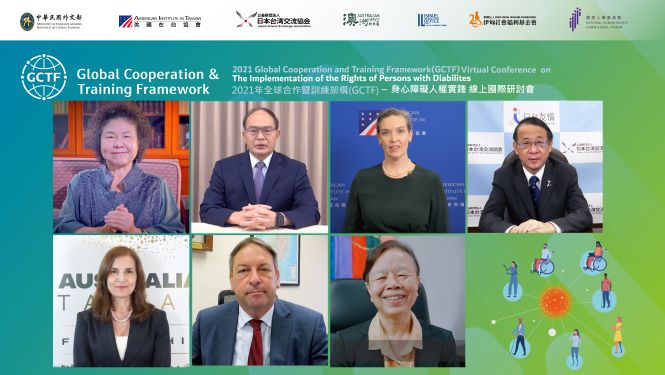Over two days (November 4th & 5th), the Japan-Taiwan Exchange Association co-hosted a GCTF virtual seminar with the theme of The Rights of Persons with Disabilities with the Ministry of Foreign Affairs (Taiwan), the American Institute in Taiwan (AIT), the Australian Office Taipei, the Israel Economic and Cultural Office in Taipei and the Eden Social Welfare Foundation.
Hiroyasu Izumi, Chief Representative of the Japan-Taiwan Exchange Association gave a speech at the opening ceremony. At the first day’s session, Yuichiro Haruna, Deputy Research Director General, the Japan Organization for Employment of the Elderly, Persons with Disabilities and Job Seekers spoke about employment opportunities and the right to work for people with disabilities in Japan.
The Japan-Taiwan Exchange Association will continue to actively contribute to GCTF in the future.
The speech from Chief Representative Izumi follows.
Distinguished guests from various countries online,
Good afternoon!
I am pleased to co-host today’s GCTF Virtual conference on “The Implementation of the Rights of Persons with Disabilities.”
I would especially like to welcome our colleagues from Israel who are joining us for the first time as a co-host of this meaningful conference.
It is estimated that about 1.3 billion people across the world suffer from some form of physical, mental, or sensory disability. To protect their human rights, it is necessary to build social systems and structures based on the following idea: that "No citizens shall be discriminated against according to whether or not they have a disability” and “a society of coexistence shall be realized with mutual respect for personality and individuality.” This is totally in line with the concept of the United Nations' Sustainable Development Goals (SDGs).
It is essential to change the perception and concept of disability at all levels of society. I am recalling the Tokyo Olympic and Paralympic games last year. In those prestigious events, athletes from all over the world demonstrated their human potential to overcome difficulties and challenges beyond their own limits. Their performances gave great hope and courage to all the people in the world.
We believe that this is the kind of society we are aiming for, where people with and without disabilities can demonstrate their full individuality and potential, and where people can truly respect each other.
In the wake of the unprecedented COVID-19 pandemic, our society continues to be faced with socio-economic disparities, divisions and still deepening conflicts. I think it is timely to discuss today’s topic. I hope the participants will have substantive and fruitful discussions.
Finally, I would like to express my appreciation to every participant and the staff for their efforts and commitment in organizing this virtual conference. I extend my best wishes for the great success of this conference.
Thank you very much.
